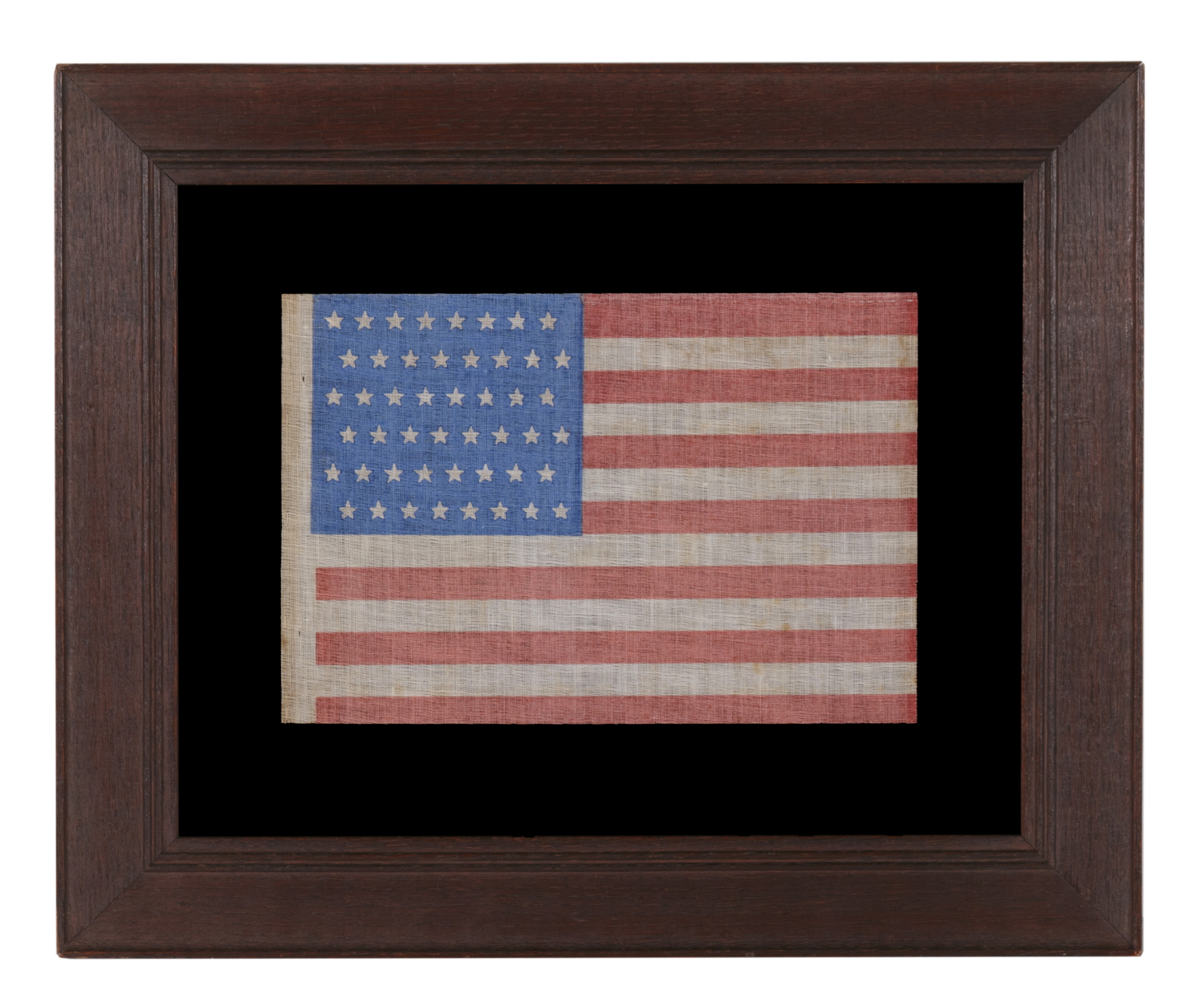
| |
48 STARS IN STAGGERED ROWS ON AN ANTIQUE AMERICAN FLAG WITH A BRILLIANT, CORNFLOWER BLUE CANTON, MADE BETWEEN 1912 - 1918, OR PERHAPS PRIOR; REFLECTS ARIZONA & NEW MEXICO STATEHOOD |
|
| Available: |
Sold |
| Frame Size (H x L): |
14.5" x 17.5" |
| Flag Size (H x L): |
7" x 10.25" |
|
| Description....: |
|
48 star American national parade flag, printed on coarse cotton, with a striking, cornflower blue canton and beautifully faded red stripes.
On June 24th, 1912, President Howard Taft signed an executive order that dictated for the first time an official configuration for the stars on the American national flag. Numerous designs were submitted for consideration, but taking direction from the War Department, Taft selected a regimented pattern that consisted of 6 justified rows of 8 stars.
The 48 star flag became official a few days later, on July 4th, which marked the official change of the "flag year". Two stars were added to reflect the addition of New Mexico and Arizona, which had respectively gained statehood on January 6th and February 14th.
Taft's order only applied to those flags made for the Department of the Government, which meant that Stars & Stripes produced for all other manner of use were unaffected. Because flag-makers had been allowed to choose their own star patterns for the previous 135 years, and because the order didn't apply to private consumption, many flags did not follow government specifications.
This flag does not conform to Taft's design. Its stars are arranged in staggered rows. Among surviving 48 star flags, one may find staggered row pattern examples that date both before and after the 1912 order and the July 4th adoption of the new star count.
Because many WWI (U.S. involvement 1917-18) images show patriotic Americans waving 48 star flags with this staggered row pattern, there is strong evidence that not every flag-maker produced the justified 6 x 8 design. In addition, some flag makers had long been adding stars before their respective states were officially added. Called “anticipatory flags” these were a reflection of both expansionism and American capitalism, as flag-makers searched for new things to market to potential buyers. Because of their presence throughout the latter half of the 19th century, in particular, it is not surprising that the practice continued and makers chose to produce 48 star flags before the 48th state entered the Union.
48 star flags with 6 staggered rows of 8 stars are documented with penciled or printed dates as early as 1896, sixteen years before the 47th and 48th stars were actually added to the flag. Because they are well-represented with this star pattern in photographs dating as late as WWI, but don't seem to appear in post-war images, the most likely window of manufacture falls sometime within this 22-year window (1896-1918).
48 remained the official star count throughout WWI, WWII (U.S. involvement 1941-45), and the Korean War (1950-53), until Alaska gained statehood in 1959 and the 49th star was added.
Mounting: The flag was mounted and framed within our own conservation department, which is led by expert staff. We take great care in the mounting and preservation of flags and have framed thousands of examples.
The solid oak, Arts & Crafts period molding has an acid-washed surface and dates to the period between 1890 and 1910. The background is 100% cotton twill, black in color. Spacers keep the textile away from the glazing, which is U.V. protective glass. Feel free to contact us for more details.
Condition: There is minor foxing and staining throughout and there is modest fading of the red stripes. The presentation is beautiful. Many of my clients prefer early flags to show their age and history of use. |
|
|
|
| Collector Level: |
Beginners and Holiday Gift Giving |
|
| Flag Type: |
Parade flag |
|
| Star Count: |
48 |
|
| Earliest Date of Origin: |
1896 |
|
| Latest Date of Origin: |
1918 |
|
| State/Affiliation: |
Arizona |
|
| War Association: |
|
|
| Price: |
SOLD |
|
| |
Views: 2259 |
|
|
|

